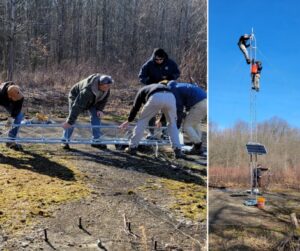(Photos and story by Carol Foss)
A newly installed Motus receiving station at Huntley Meadows Park in Alexandria, Virginia stands ready and waiting to detect tagged Rusty Blackbirds on their way north. Funded through a Competitive State Wildlife Grant that is supporting new receiving stations in the southeastern states and maintenance of existing stations in New England and the Mid-Atlantic, this station is located at an important Rusty Blackbird migration stopover and wintering area. Conservation planning for declining species requires understanding and addressing threats both on the breeding grounds and during the non-breeding period. The Motus Wildlife Tracking System is providing critical information on the routes New Hampshire’s Rusty Blackbirds are taking on migration, and new receiving stations in the southeastern states will help to identify wintering areas for “our” breeding population.

Led by Todd Alleger and Garrett Rhyne of the American Bird Conservancy (ABC), the installation team included additional staff from ABC and the Fairfax County Park Authority. Carol Foss and Anna Peel from NH Audubon’s Rusty Blackbird project were also on hand to assist.
The 1,500 acres of forests and wetlands at Huntley Meadows are an oasis for breeding, migrating, and wintering birds in an extensive landscape of urban development. Located 10 miles from the Capitol building, the park’s trails, boardwalks, and educational center provide local residents with year-round opportunities to experience and learn about the natural world.
